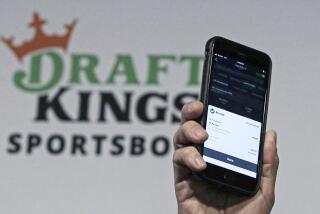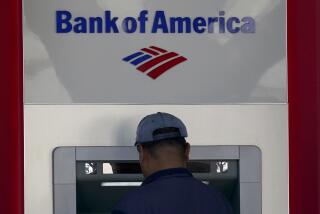2 Firms to Compensate Small Investors for Delayed Trades
- Share via
Two of Wall Street’s biggest brokerage firms said they will compensate small investors for money they lost on delayed trades during Tuesday’s record trading session.
Merrill Lynch & Co., the biggest U.S. securities firm in terms of brokers, plans to pay as much as $10 million to about 3,000 individual clients who trade on the Nasdaq Stock Market, a spokesman for the firm said.
Smith Barney Inc., a unit of Travelers Group and the second-largest broker, will repay clients for losses caused by glitches in its trading systems, a spokesman said.
Separately, Prudential Securities Inc., a unit of Prudential Insurance Co. and the fifth-biggest broker, said it was studying whether to reimburse affected clients.
“We are still looking at what the numbers will be, but they were small,” Prudential Securities spokesman Charles Perkins said. “We will resolve any issues with clients about these trades.”
The payments stem from trading delays during the stock market’s rebound from Monday’s 7.2% tumble. The New York Stock Exchange, the biggest U.S. stock market, and Nasdaq, the second largest, had their first billion-share trading days Tuesday.
The planned payments to investors was first reported in the Wall Street Journal on Thursday.
At Merrill, some clients entered orders with brokers in the morning and didn’t get them filled until late in the trading session or after the markets closed. Merrill said it would process the trades at the prices in effect when the orders were made.
Merrill’s 3,000 problem trades represented 6% of the 50,000 total trades the firm made Tuesday on Nasdaq.
“We will interact promptly to make sure that no client is disadvantaged,” Merrill spokesman Tim Gilles said.
Merrill said there were no problems with the firm’s institutional clients or with trading on the NYSE. Nasdaq’s new trading rules, designed to ensure that investors get the best available prices, contributed to the delays, Gilles said.
Before the rules took effect early this year, Merrill posted about 50,000 price quotes a day. On Tuesday, the firm posted 250,000, Gilles said.
At Smith Barney, a heavy volume of buy orders swamped the firm’s computer systems and forced brokers to enter orders manually for 35 minutes, according to Smith Barney spokesman Michael Schlein. There were also delays during the last hour of trading.
Schlein couldn’t estimate how many trades were affected or how much it might cost the firm. Smith Barney Chairman James Dimon told brokers the firm “would do the right thing for customers,” meaning it would make sure trades are executed at the price in effect when the order was made.
At Prudential, the firm’s software system broke down, blocking orders from being filled for about 20 minutes, a representative said. A backlog of orders prevented Prudential from processing its Nasdaq trades for 15 minutes at the opening.
Other firms had fewer problems. Morgan Stanley, Dean Witter, Discover & Co. had delays on fewer than 100 of the 42,000 Nasdaq trades handled for individual clients, a person familiar with the situation said.
Goldman, Sachs & Co.’s electronic system for handling orders broke down for about 75 minutes, a spokesman said. The orders either were phoned in to the NYSE by Goldman’s brokers or diverted to another electronic order system.
“We’re not aware of anybody who lost money,” the spokesman said.
More to Read
Inside the business of entertainment
The Wide Shot brings you news, analysis and insights on everything from streaming wars to production — and what it all means for the future.
You may occasionally receive promotional content from the Los Angeles Times.










